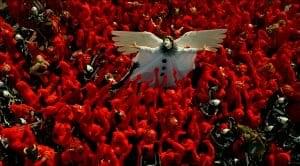
Celebrated cult director Alejandro Jodorowsky looks at his turbulent young adulthood in Chile with the usual combination of emotional weight and provocative posture. His second autobiographical drama, Endless Poetry, is as overwhelming as its prequel, The Dance of Reality (2013).
Like happened in the preceding film, the director uses a rich color palette to depict his past misadventures, staging the scenes with gusto and populating the indecorous settings with occasional stylized choreographies and a few bizarre characters, so commonly associated with his body of work.

“…the touching finale he needed to accomplish a freeing, personal mission.”
This slice of life takes us to his parents’ home in Matucana, where the young Alejandro (Jeremias Herskovits) discovers Garcia Lorca, and almost immediately decides to be a poet. His austere father, Jaime (Brontis Jodorowsky – director’s eldest son), becomes highly discontented since he already had envisioned a career in medicine for his only son. We see that Alejandro’s intentions/choices were systematically castrated by his father, a merciless punisher who defended that poetry was for homosexuals. Even during a strong earthquake, the poor Alejandro was encouraged to hide his fear and forced to react ‘like a man’. Conversely, his mother, Sara (Pamela Flores), was a sweet person, but not strong enough to go against her husband’s authoritative decisions and biased ideas. All her speeches are sung like an aria, a way that Jodorowsky found to tell us how much comforting sounded her voice in those difficult times.
Acquiring as much strength as necessary to oppose his “shitty family”, as he used to say, and following his most basic instincts, the now adult Alejandro (Adan Jodorowsky, the youngest son of the filmmaker) treads his own individual path, leaving his parents behind without notice. His world will change when he falls for Stella Diaz (a double role for Pamela Flores), a mundane red-haired poetess of whom he becomes insanely dependent.
Throughout this journey of self-discovery, he briefly meets with creative fellows such as Nicanor Parra and Andre Breton, and becomes the best friend of Enrique Lihn, the most bohemian of those poets, who loved to challenge the limits of possibility.

“Alongside the eccentric imagery, the superior narrative flow is never ambiguous but persistently fascinating.”
A few unforgettable scenes are engraved in my memory like the one that Alejandro was almost raped by a bunch of wild men in a sinister nightclub, or when he had sex with a dwarf woman when she was having her period, or when he impersonates a clown in a circus and tries to convince himself he’s not guilty.
Alongside the eccentric imagery, the superior narrative flow is never ambiguous but persistently fascinating. The unabashed artistic world of Jodorowsky is like this: offbeat, dramatic, poetic, phantasmagoric, humorous, atrocious… Even so, I found Endless Poetry more poetic and less visceral than his previous cinematic creations.
In a couple crucial scenes, the director, in person, comes into view to console and advise his young persona, to call him to reason, trying to compensate that huge emotional gap caused by frustration, anger, and lack of forgiveness.
At the end, Jodorowsky ekes out a better existence for himself by absolving his father from everything that went wrong. This was the touching finale he needed to accomplish a freeing, personal mission that turned out to be beautifully artistic too.

Endless Poetry (2016) – Written and directed by Alejandro Jodorowsky. Starring: Brontis Jodorowsky, Adan Jodorowsky, Alejandro Jodorowsky, Pamela Flores, Leandro Taub.
8 out of 10
